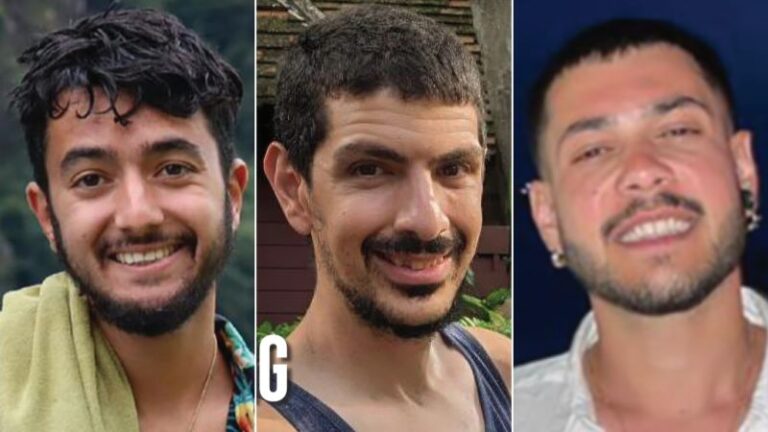CNN
—
Israeli Prime Minister Benjamin Netanyahu said Monday he remained “committed” to a U.S.-backed Israeli proposal for a ceasefire and hostage release, amid backlash from families of Israeli hostages for appearing to withdraw his support for the proposal a day earlier.
The proposal, outlined by U.S. President Joe Biden last month, sets out terms for the eventual release of all remaining hostages in exchange for a permanent ceasefire and the withdrawal of Israeli troops from Gaza.
But Netanyahu told Israel’s Channel 14 on Sunday he was ready to reach a “partial agreement” with Hamas to return only some of the hostages in Gaza, contradicting a proposal approved by his own war cabinet.
“It doesn’t mean the war will end, but the war at this stage will end in Rafah. That’s a fact. We will continue to cut grass later,” Netanyahu told the right-wing broadcaster in his first exclusive interview with local Israeli media since Oct. 7.
His apparent rejection of proposals for a ceasefire and the release of the hostages drew fierce backlash from Israeli politicians and from groups representing Israeli hostages and their families, which are powerful political forces in the country.
The Forum of Families of Missing Hostages and Others called Netanyahu’s comments to Channel 14 “an unprecedented national failure and a failure to achieve our war objectives.”
Opposition leader Gadi Eisenkot, who resigned a week before Netanyahu dissolved Israel’s war cabinet, also criticized Netanyahu, saying “there are soldiers fighting now for the war objective of returning the hostages.”
On Monday, State Department spokesman Matthew Miller said the US opposed continued military operations in Gaza, which “only leads to continued conflict, continued instability and continued insecurity for Israel,” he told a news conference.
The Forum for Hostages and Missing Families later released a video showing Hamas’ kidnapping of three Israelis on October 7. In the video, the three – Hersh Goldberg Polin, Or Levi and Elijah Cohen – are seen in the back of a pickup truck being driven along a wooded road by gunmen armed with assault weapons. “There are dogs, there are dogs,” one of the gunmen can be heard saying.
Goldberg Pollin, an Israeli-American who was 23 at the time, had blood on his face and what appeared to be a bone protruding from his left arm, blown apart after a grenade was thrown into the bunker where he and several others were hiding from Hamas militants.
Hamas released Goldberg-Polin’s video in April, the first evidence that he had survived the blast, in which he, like other Israeli hostages featured in Hamas propaganda videos, criticizes the Netanyahu government — a comment he was almost certainly making under duress after having been held captive in Gaza for six months.
“With each passing day the hostages are at greater risk and their chances of safe return diminish,” the forum said in a statement, calling for an agreement to return all hostages home.
Netanyahu hastily retracted his comments to Channel 14. On Monday, an Israeli source familiar with the matter told CNN that Israel, through intermediaries in Qatar and Egypt, had stressed to Hamas its willingness to abide by Israel’s proposal for a ceasefire and the release of the hostages.
“Prime Minister Netanyahu’s statement in the Knesset was an important correction. To this day he has not publicly stated his support for the Israeli proposal. Prime Minister Netanyahu’s statement put the ball in Hamas’s hands. If Hamas says yes, the deal will be done. We now need to push for the agreement with all our might,” the Israeli source said.
In a brief statement after the interview on Sunday, Netanyahu’s office clarified his remarks, saying “the prime minister made it clear that Israel will not withdraw from Gaza until all 120 hostages, both dead and alive, are returned.”
Netanyahu sought to further tone down his extreme rhetoric on Monday, telling the Knesset, the Israeli parliament, “We are committed to the Israeli proposal that President Biden welcomed. Our position has not changed.”
Fayez Abu Rumeleh/Middle East Images/AFP/Getty Images
Relatives and supporters of the Israeli hostages held protests in Tel Aviv in April to demand their release.
The release of the video may be an attempt to remind Israeli security ministers of their original war objective – to return the hostages who remain in Gaza nearly nine months after their kidnapping.
The Israeli army announced that one of the soldiers, Senior Sergeant Mohammad el-Atrash (39), was killed on October 7 and his body was being held by Hamas. Prior to this announcement, the Israeli Prime Minister’s Office said on June 8 that at least 41 hostages were killed in the October 7 attack and that their bodies were believed to be being held in the Gaza Strip.
At least five American hostages are believed to be alive, while four others are believed to be dead.
More than one million Palestinians took refuge in Rafah before Israel launched an air and ground operation in the southern Gaza city, ignoring international calls. Around 800,000 people have since fled the city, with the UN food agency describing the situation there as “apocalyptic.”
The city’s border crossing with Egypt is a key entry point for humanitarian aid but has remained closed since Israeli forces seized it early last month.
International pressure over Israel’s actions in Gaza has been growing since it launched its military operation in Rafah. Last month, the United Nations’ highest court ordered Israel to immediately end its controversial military operation in Gaza, citing “dire” humanitarian conditions.

